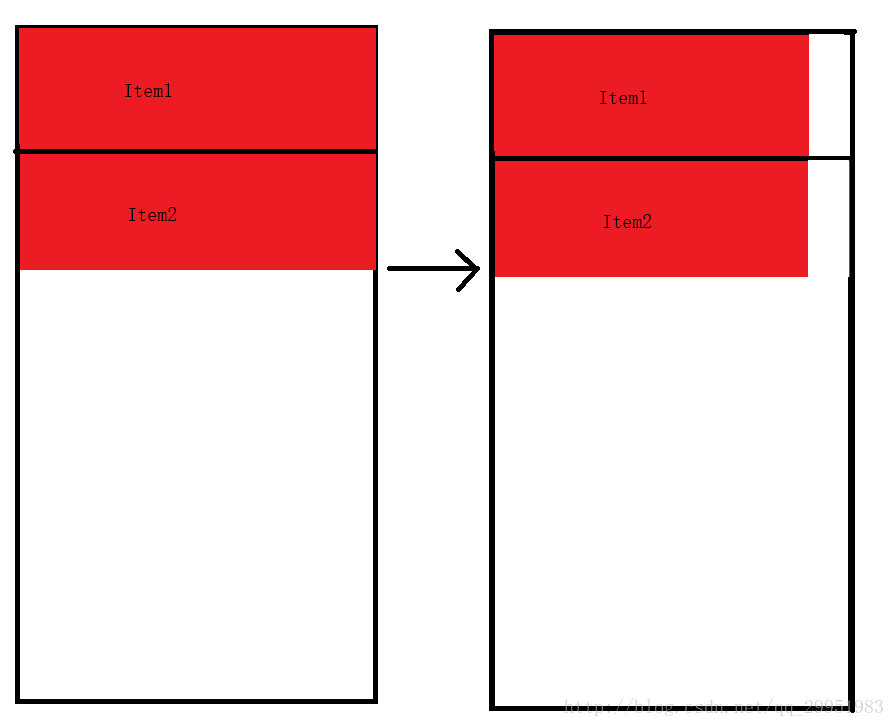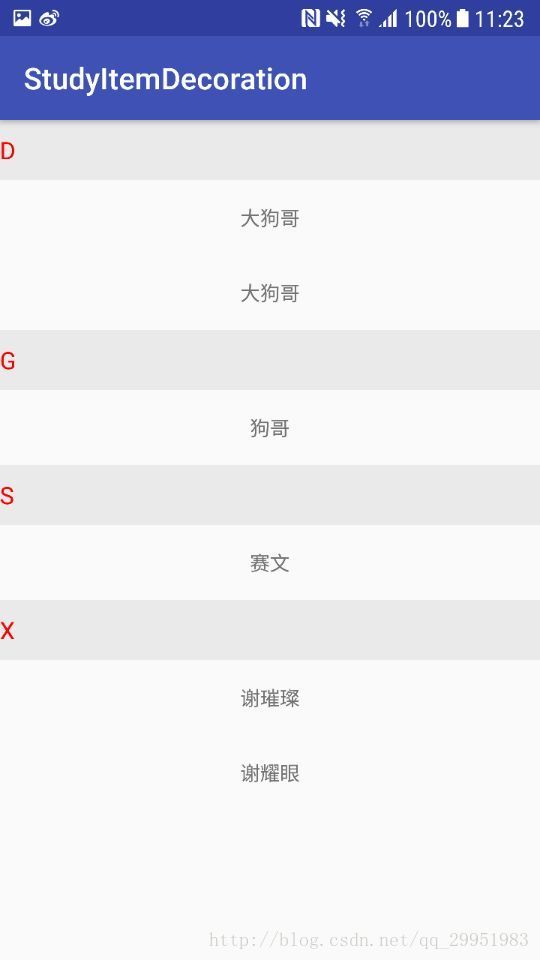RecyclerView高级应用——自定义ItemDecoration
RecyclerView的用法这里就不讲了,之前加分割线是直接在Item布局加的,后来想想这种解决办法实在是太low了。对技术有追求的人当然要用更高级的办法。啊哈哈哈~
方法讲解
在此之前一定要先介绍一下方法,这样可以更方便你的理解。
我们需要编写一个类继承RecyclerView.ItemDecoration
并重写三种方法:
getItemOffsets:
这个可以简单的理解成为RecyclerView的每一个Item设置一个偏移量你可一个理解成设置了一个margin。
上图就是通过getItemOffsets方法中的 outRect.set(0, 0, 0, 100);进行设置的。
如果我们要为RecyclerView增加分割线,我们应该大致做一下的准备:
1.得到系统默认的listDivider属性,并通过它取得对应的Drawable对象。
2.测量Drawable对象的宽高。
3.根据情况判断是需要水平分割线还是垂直分割线
a.水平分割线:
outRect.set(0, 0, 0, mDivider.getIntrinsicHeight());我们应该底部预留分割线的高度。
b.垂直分割线:
outRect.set(0, 0, mDivider.getIntrinsicWidth(), 0);我们应该右侧预留分割线的宽度。
大家可以看到了,右边空出来些东西,是不是很不美观,那当然就需要往上面画一些东西喽。我们就需要用onDraw()这个方法。
onDraw:
这个方法就是重点了,方法的参数里面有一个Canvas c的对象,了解自定义View的人都应该觉得这个方法很相似我们可以在这上面画文字、bitmap、圆等等等等。
onDrawOver:
这个方法是相对与整个视图的,不受Item的限制,比如我们可以在视图的顶部加一个悬浮的层等等。
这三个方法简单的讲到这里,下面通过实践去更深刻的理解。
代码:
class MyItemDecoration extends RecyclerView.ItemDecoration {
private final Drawable mLine;
private final int orientation;
public MyItemDecoration(Context context, int orientation) {
this.orientation = orientation;
int[] attrs = new int[]{android.R.attr.listDivider};
TypedArray a = context.obtainStyledAttributes(attrs);
mLine = a.getDrawable(0);
a.recycle();
}
@Override
public void onDraw(Canvas c, RecyclerView parent, RecyclerView.State state) {
super.onDraw(c, parent, state);
if (orientation == RecyclerView.HORIZONTAL) {
drawVertical(c, parent, state);
} else if (orientation == RecyclerView.VERTICAL) {
drawHorizontal(c, parent, state);
}
}
@Override
public void onDrawOver(Canvas c, RecyclerView parent, RecyclerView.State state) {
super.onDrawOver(c, parent, state);
}
@Override
public void getItemOffsets(Rect outRect, View view, RecyclerView parent, RecyclerView.State state) {
super.getItemOffsets(outRect, view, parent, state);
if (orientation == RecyclerView.HORIZONTAL) {
//画垂直线
outRect.set(0, 0, mLine.getIntrinsicWidth(), 0);
} else if (orientation == RecyclerView.VERTICAL) {
//画水平线
outRect.set(0, 0, 0, mLine.getIntrinsicHeight());
}
}
/**
* 画垂直分割线
*/
private void drawVertical(Canvas c, RecyclerView parent, RecyclerView.State state) {
int childCount = parent.getChildCount();
for (int i = 0; i < childCount; i++) {
View child = parent.getChildAt(i);
int left = child.getRight();
int top = child.getTop();
int right = left + mLine.getIntrinsicWidth();
int bottom = child.getBottom();
mLine.setBounds(left, top, right, bottom);
mLine.draw(c);
}
}
/**
* 画水平分割线
*/
private void drawHorizontal(Canvas c, RecyclerView parent, RecyclerView.State state) {
int childCount = parent.getChildCount();
for (int i = 0; i < childCount; i++) {
View child = parent.getChildAt(i);
int left = child.getLeft();
int top = child.getBottom();
int right = child.getRight();
int bottom = top + mLine.getIntrinsicHeight();
mLine.setBounds(left, top, right, bottom);
mLine.draw(c);
}
}
}我们还可以重新定义一下系统默认分割线的颜色及宽度
style
<style name="AppTheme" parent="Theme.AppCompat.Light.DarkActionBar">
<item name="android:listDivider">@drawable/customizelistdivider item>
style>customizelistdivider.xml
<shape xmlns:android="http://schemas.android.com/apk/res/android"
android:shape="rectangle" >
<gradient
android:endColor="#ff0000ff"
android:startColor="#ffff0000"
android:type="linear" />
<size android:height="4dp"
android:width="4dp"/>
shape>一条华丽丽丽丽的分割线就出来了
有了上述知识的铺垫,我们就可以画出更多好玩的东西了
例如:
简单说一下思路:
思路一
这回我们是在顶部进行预留的区域进行填写字母,但是我们发现不是每一个都预留了区域,只有当前拼音的第一个预留了区域。
这时我们应该进行判断:
a.如果当前的itemPosition为0时,我们需要预留。
b.如果第二个itemPosition所代表的首字母与第一个不同时,我们需要预留。
c.其他情况为0就可以了
@Override
public void getItemOffsets(Rect outRect, int itemPosition, RecyclerView parent) {
super.getItemOffsets(outRect, itemPosition, parent);
int Offsets = 0;
String letter = PinyinUtils.getPinyin(mData.get(itemPosition)).charAt(0) + "";
if (itemPosition == 0) {
Offsets = dip2px(40);
} else {
String preLetter = PinyinUtils.getPinyin(mData.get(itemPosition - 1)).charAt(0) + "";
if (!letter.equalsIgnoreCase(preLetter)) {
Offsets = dip2px(40);
}
}
outRect.set(0, Offsets, 0, 0);
}思路二
到这一步就是画文字了,我们主要找好每一个Item所对应的高就可以了,至于left,就直接为0就可以了。
注意注意:我们现在所求的上下左右的区间,不是Item的区间,而是我们要画字母的矩形区间
int left = 0;
//我们要对多出来的地方减掉
int top = child.getTop() - dip2px(40);
int right = child.getRight();
//这时候注意不应该减去dip2px(40),而是要减去Item的高
int bottom = child.getBottom() - child.getMeasuredHeight();代码:
MyDecoration
public class MyDecoration extends RecyclerView.ItemDecoration {
Context mContext;
List sortList;
Paint paint = new Paint(Paint.ANTI_ALIAS_FLAG);
public MyDecoration(Context context, List data) {
mContext = context;
sortList = data;
paint.setTextSize(sp2px(16));
paint.setColor(Color.RED);
}
@Override
public void onDrawOver(Canvas c, RecyclerView parent, RecyclerView.State state) {
super.onDrawOver(c, parent, state);
}
@Override
public void onDraw(Canvas c, RecyclerView parent, RecyclerView.State state) {
super.onDraw(c, parent, state);
drawLetterToItemLeft(c, parent);
}
private void drawLetterToItemLeft(Canvas c, RecyclerView parent) {
RecyclerView.LayoutManager layoutManager = parent.getLayoutManager();
int childCount = parent.getChildCount();
for (int i = 0; i < childCount; i++) {
int position = ((LinearLayoutManager) layoutManager).findFirstVisibleItemPosition() + i;
View child = parent.getChildAt(i);
int left = 0;
int top = child.getTop() - dip2px(40);
int right = child.getRight();
int bottom = child.getBottom() - child.getMeasuredHeight();
Rect targetRect = new Rect(left, top, right, bottom);
paint.setColor(Color.RED);
Paint.FontMetricsInt fontMetrics = paint.getFontMetricsInt();
int baseline = (targetRect.bottom + targetRect.top - fontMetrics.bottom - fontMetrics.top) / 2;
//当前名字拼音的第一个字母
String letter = sortList.get(position).getFirstLetter();
if (position == 0) {
paint.setColor(Color.parseColor("#eaeaea"));
c.drawRect(targetRect, paint);
drawLetter(letter, 0, baseline, c, parent);
} else {
String preLetter = sortList.get(position - 1).getFirstLetter();
if (!letter.equalsIgnoreCase(preLetter)) {
paint.setColor(Color.parseColor("#eaeaea"));
c.drawRect(targetRect, paint);
drawLetter(letter, 0, baseline, c, parent);
}
}
}
}
private void drawLetter(String letter, float width, float height, Canvas c, RecyclerView parent) {
paint.setColor(Color.RED);
c.drawText(letter, 0, height, paint);
}
@Override
public void getItemOffsets(Rect outRect, int itemPosition, RecyclerView parent) {
super.getItemOffsets(outRect, itemPosition, parent);
int Offsets = 0;
String letter = sortList.get(itemPosition).getFirstLetter();
if (itemPosition == 0) {
Offsets = dip2px(40);
} else {
String preLetter = sortList.get(itemPosition - 1).getFirstLetter();
if (!letter.equalsIgnoreCase(preLetter)) {
Offsets = dip2px(40);
}
}
outRect.set(0, Offsets, 0, 0);
}
private int dip2px(int dip) {
float density = mContext.getResources().getDisplayMetrics().density;
int px = (int) (dip * density + 0.5f);
return px;
}
public int sp2px(int sp) {
return (int) (TypedValue.applyDimension(TypedValue.COMPLEX_UNIT_SP, sp, mContext.getResources().getDisplayMetrics()) + 0.5f);
}
} User(此类来源于网络)
public class User implements Comparable {
private String name; // 姓名
private String pinyin; // 姓名对应的拼音
private String firstLetter; // 拼音的首字母
public User() {
}
public User(String name) {
this.name = name;
pinyin = Cn2Spell.getPinYin(name); // 根据姓名获取拼音
firstLetter = pinyin.substring(0, 1).toUpperCase(); // 获取拼音首字母并转成大写
if (!firstLetter.matches("[A-Z]")) { // 如果不在A-Z中则默认为“#”
firstLetter = "#";
}
}
public String getName() {
return name;
}
public String getPinyin() {
return pinyin;
}
public String getFirstLetter() {
return firstLetter;
}
@Override
public int compareTo(User another) {
if (firstLetter.equals("#") && !another.getFirstLetter().equals("#")) {
return 1;
} else if (!firstLetter.equals("#") && another.getFirstLetter().equals("#")){
return -1;
} else {
return pinyin.compareToIgnoreCase(another.getPinyin());
}
}
}
Cn2Spell(此类来源于网络)
/**
* 汉字转换位汉语拼音,英文字符不变
*/
public class Cn2Spell {
public static StringBuffer sb = new StringBuffer();
/**
* 获取汉字字符串的首字母,英文字符不变
* 例如:阿飞→af
*/
public static String getPinYinHeadChar(String chines) {
sb.setLength(0);
char[] chars = chines.toCharArray();
HanyuPinyinOutputFormat defaultFormat = new HanyuPinyinOutputFormat();
defaultFormat.setCaseType(HanyuPinyinCaseType.LOWERCASE);
defaultFormat.setToneType(HanyuPinyinToneType.WITHOUT_TONE);
for (int i = 0; i < chars.length; i++) {
if (chars[i] > 128) {
try {
sb.append(PinyinHelper.toHanyuPinyinStringArray(chars[i], defaultFormat)[0].charAt(0));
} catch (Exception e) {
e.printStackTrace();
}
} else {
sb.append(chars[i]);
}
}
return sb.toString();
}
/**
* 获取汉字字符串的第一个字母
*/
public static String getPinYinFirstLetter(String str) {
sb.setLength(0);
char c = str.charAt(0);
String[] pinyinArray = PinyinHelper.toHanyuPinyinStringArray(c);
if (pinyinArray != null) {
sb.append(pinyinArray[0].charAt(0));
} else {
sb.append(c);
}
return sb.toString();
}
/**
* 获取汉字字符串的汉语拼音,英文字符不变
*/
public static String getPinYin(String chines) {
sb.setLength(0);
char[] nameChar = chines.toCharArray();
HanyuPinyinOutputFormat defaultFormat = new HanyuPinyinOutputFormat();
defaultFormat.setCaseType(HanyuPinyinCaseType.LOWERCASE);
defaultFormat.setToneType(HanyuPinyinToneType.WITHOUT_TONE);
for (int i = 0; i < nameChar.length; i++) {
if (nameChar[i] > 128) {
try {
sb.append(PinyinHelper.toHanyuPinyinStringArray(nameChar[i], defaultFormat)[0]);
} catch (Exception e) {
e.printStackTrace();
}
} else {
sb.append(nameChar[i]);
}
}
return sb.toString();
}
}由于我们用到了排序还需要引入一个jar包
pinyin4j-2.5.0.jar



